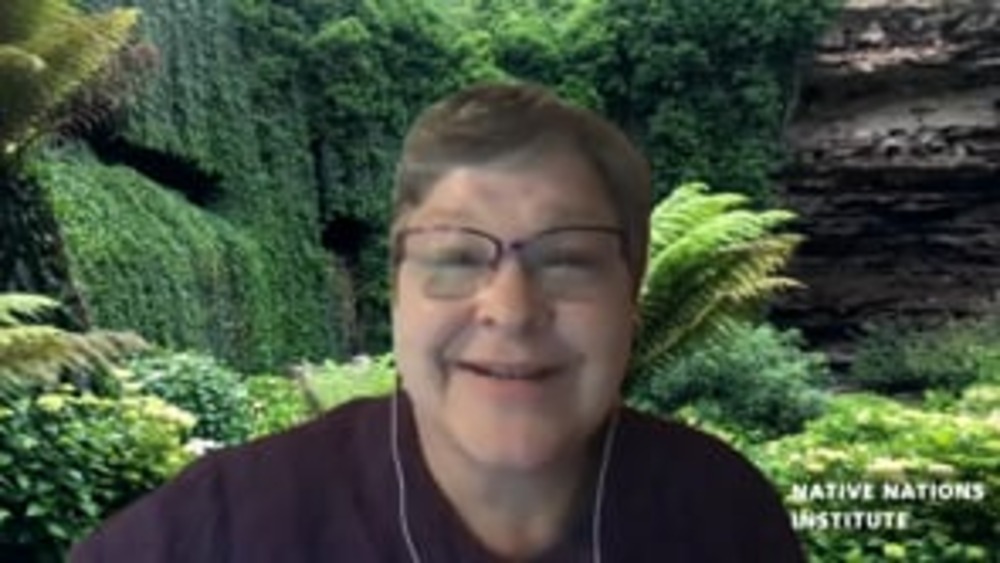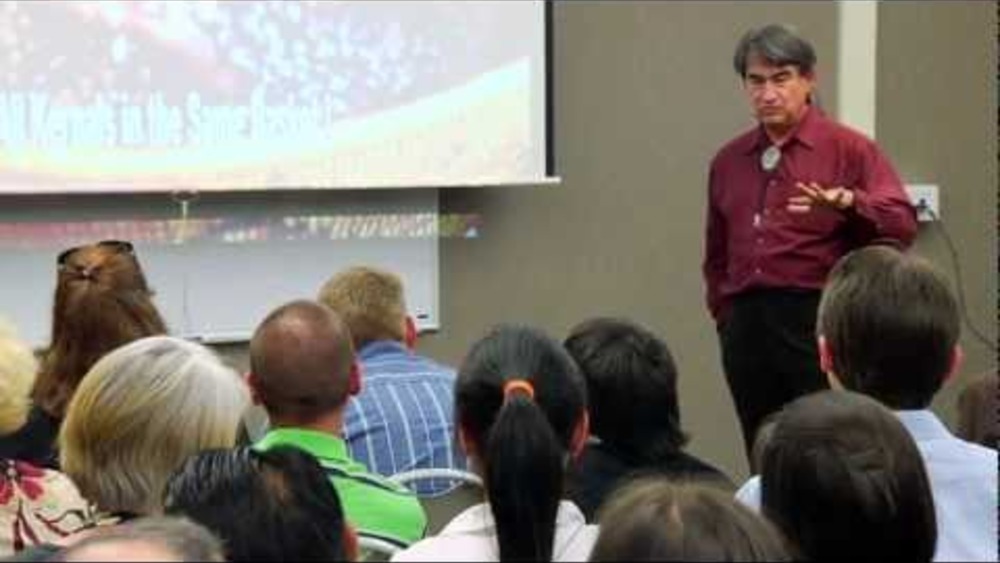Native leaders define what nation building means to them, and what it entails for Native nations who are working to reclaim control over their own affairs and build vibrant futures of their own design.
Additional Information
Ettawageshik, Frank. Native Nations Institute for Leadership, Management, and Policy, University of Arizona. Tucson, Arizona. April 6, 2010. Interview.
Frias, Herminia. Native Nations Institute for Leadership, Management, and Policy, University of Arizona. Tucson, Arizona. May 14, 2007. Interview.
Marquez, Deron. Native Nations Institute for Leadership, Management, and Policy, University of Arizona. Tucson, Arizona. March 26, 2009. Interview.
Pierre, Sophie. Native Nations Institute for Leadership, Management, and Policy, University of Arizona. Tucson, Arizona. October 21, 2008. Interview.
Pinkham, Jaime. Native Nations Institute for Leadership, Management, and Policy, University of Arizona. Tucson, Arizona. March 26, 2009. Interview.
Sampsel, Roy. Native Nations Institute for Leadership, Management, and Policy, University of Arizona. Tucson, Arizona. August 31, 2010. Interview.
Shendo, Jr., Benny. Native Nations Institute for Leadership, Management, and Policy, University of Arizona. Tucson, Arizona. May 14, 2007. Interview.
Vizenor, Erma. Native Nations Institute for Leadership, Management, and Policy, University of Arizona. Tucson, Arizona. March 25, 2010. Interview.
Transcript
Benny Shendo, Jr.:
"It's not necessarily about nation building, but its about re-building because if you look at our communities historically, we were very powerful nations and all that changed. I believe that we still have the, at least, the values and those things that are important to us as Indian people to re-build our nations. But it's going to take some time because this whole re-building is really going to -- I believe -- take us down this surge of who we are to re-establish that identity again."
Herminia Frias:
"In a practical way, nation building is: building strong governments, transparency in governments, fairness in governments, equity among tribal members, creating an economy for our membership and for the tribe in general for the future."
Jaime Pinkham:
"I think nation building is having the freedom to determine the destiny for your community, and to be able to put together the institutions, the forms of laws and conduct that is necessary to meet the services for your community. And it's the freedom to chose who your partners are going to be, freedom to chose what your court systems will look like, but it also takes -- I feel -- a great deal of wisdom to practice nation building at a very deliberative approach."
Deron Marquez:
"We always called it re-building because I think, one of the things -- from the community's standpoint -- is that the community, through time, just simply forgot. And so, in our opinion, it was a matter of getting the community to remember the vibrance that was once ours and took place in our communities. We were a nomadic group and we moved around a lot, but nonetheless we had a lot of -- by today's standards -- success. We had a lot of wealth, in the sense of culture, in the sense of the abilities to function as a society within our own sphere of societies. I think it's just a process by which you need to get your community to re-focus back to what is meaningful to them, again, and make them remember. And once you're able to accomplish that type of connection where they start to think and feel and believe in more of an authentic disposition, the process of re-building your nation becomes easier."
Frank Ettawageshik:
"It has a lot of different parts to it. Some people think it's the constitution. Some people think it’s economic development. And those are components of it clearly, and are very important and maybe some of the more visible parts, but nation building to me is building the capacity of the citizenry of your nation to deal with change and to deal with the issues that come before it."
Sophie Pierre:
"What it looks like [is] a room that is full of people from every generation, from every community, speaking about issues that are important, looking at a huge map of our traditional territory, and talking about which areas need to be protected, which areas we could actually use ourselves for development, and which areas we're simply going to have an advisory capacity, and those decisions being made not by educated individuals from somewhere else, but from all of these people that are in this room that are all related, and that have a stake at what is being decided here."
Roy Sampsel:
"Tribal governments, tribal communities, tribal nations had always had the capacity to manage themselves and had over a whole series of time frames. What we have now is the understanding that recapturing that capacity to be self-governance [sic], self-directed is extremely important. And what you end up with now in this sort of, if you will, rebirth of the building of these nations is what are some of the contemporary pieces that you're going to put in place so that that happens within the context of the world in which we find ourselves, but founded on the very essential premises that the culture and the history is a driving force? So, the rebuilding of nations is really sort of the incorporation of a broader set of circumstances, than may have existed when the nations were exercising their sovereignty, their ability to govern and manage themselves within their own environment, literally centuries ago."
Erma Vizenor:
"When we strengthen our own governments, institutionally, culturally and with the human resources, the human assets and capital we have then we will be nation building, we will have, we will be strong nations."


